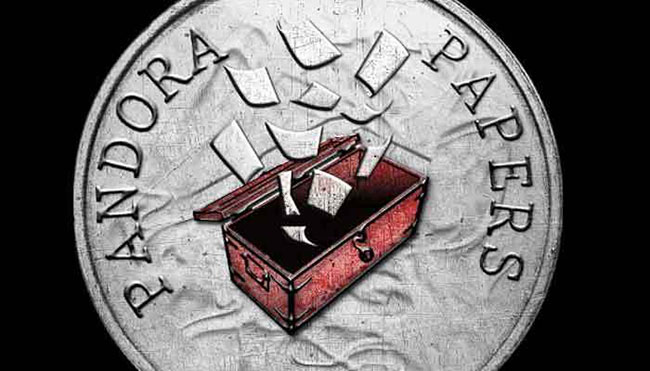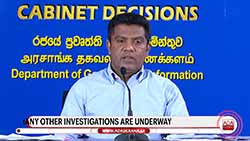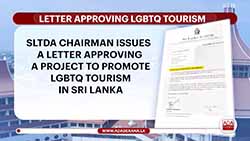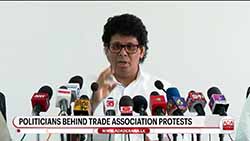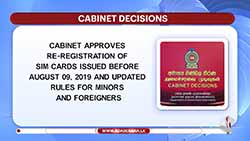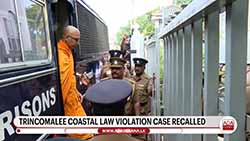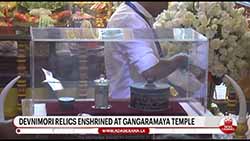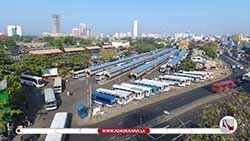Former Sri Lankan minister named in Pandora Papers
October 4, 2021 08:30 am
Hundreds of world leaders, powerful politicians, billionaires, celebrities, religious leaders and drug dealers have been hiding their investments in mansions, exclusive beachfront property, yachts and other assets for the past quarter-century, according to a review of nearly 12 million files obtained from 14 firms located around the world.
The report released Sunday by the International Consortium of Investigative Journalists involved 600 journalists from 150 media outlets in 117 countries.
It’s being dubbed the “Pandora Papers” because the findings shed light on the previously hidden dealings of the elite and the corrupt, and how they have used offshore accounts to shield assets collectively worth trillions of dollars.
Former Sri Lanka Minister Nirupama Rajapaksa’s name has also been mentioned in the Panama Papers.
Former minister Nirupama Rajapaksa and her husband Nadesan, as documented by the Pandora Papers, are the actual economic beneficiaries of an offshore company, managed by a Singapore trust firm, used to purchase luxury residences in London and Sydney, Australia.
The anonymous real estate safe is still active in 201 9, when the available documents stop, it states.
A former Member of Parliament, Nirupama served as deputy minister of water supply and drainage from 2010 to 2015.
The more than 330 current and former politicians identified as beneficiaries of the secret accounts include Jordan’s King Abdullah II, former U.K. Prime Minister Tony Blair, Czech Republic Prime Minister Andrej Babis, Kenyan President Uhuru Kenyatta, Ecuador’s President Guillermo Lasso, and associates of both Pakistani Prime Minister Imran Khan and Russian President Vladimir Putin.
The billionaires called out in the report include Turkish construction mogul Erman Ilicak and Robert T. Brockman, the former CEO of software maker Reynolds & Reynolds.
Many of the accounts were designed to evade taxes and conceal assets for other shady reasons, according to the report.
The Pandora Papers are a follow-up to a similar project released in 2016 called the “Panama Papers” compiled by the same journalistic group.
The latest bombshell is even more expansive, porting through nearly 3 terabytes of data — the equivalent of roughly 750,000 photos on a smartphone — leaked from 14 different service providers doing business in 38 different jurisdictions in the world. The records date back to the 1970s, but most of the files span from 1996 to 2020.
In contrast, the Panama Papers culled through 2.6 terabytes of data leaked by one now-defunct law firm called Mossack Fonseca that was located in the country that inspired that project’s nickname.
The latest investigation dug into accounts registered in familiar offshore havens, including the British Virgin Islands, Seychelles, Hong Kong and Belize. But some of the secret accounts were also scattered around in trusts set up in the U.S., including 81 in South Dakota and 37 in Florida.
Some of the initial findings released Sunday painted a sordid picture of the prominent people involved.
For instance, the investigation found advisers helped King Abdullah II of Jordan set up at least three dozen shell companies from 1995 to 2017, helping the monarch buy 14 homes worth more than $106 million in the U.S. and the U.K. One was a $23 million California ocean-view property bought in 2017 through a British Virgin Islands company. The advisers were identified as an English accountant in Switzerland and lawyers in the British Virgin Islands.
There was no immediate comment from Jordan’s Royal Palace.
U.K attorneys for Abdullah said he isn’t required to pay taxes under his country’s law and hasn’t misused public funds, adding that there are security and privacy reasons for him to have holdings through offshore companies, according to the report. The attorneys also said most of the companies and properties are not connected to the king or no longer exist, though they declined to provide details.
Blair, U.K. prime minister from 1997 to 2007, became the owner of an $8.8 million Victorian building in 2017 by buying a British Virgin Islands company that held the property, and the building now hosts the law firm of his wife, Cherie Blair, according to the the investigation. The two bought the company from the family of Bahrain’s industry and tourism minister, Zayed bin Rashid al-Zayani. Buying the company shares instead of the London building saved the Blairs more than $400,000 in property taxes, the investigation found.
The Blairs and the al-Zayanis both said they didn’t initially know the other party was involved in the deal, the probe found. Cherie Blair said her husband wasn’t involved in the purchase, which she said was meant to bring “the company and the building back into the U.K. tax and regulatory regime.” She also said she did not want to own a British Virgin Islands company and that the “seller for their own purposes only wanted to sell the company,” which is now closed.
A lawyer for the al-Zayanis said they complied with U.K. laws.
Khan, the Pakistani prime minister, is not accused of any wrongdoing. But members of his inner circle, including Finance Minister Shaukat Fayaz Ahmed Tarin, are accused of hiding millions of dollars in wealth in secret companies or trusts, according to the journalists’ findings.
In a tweet, Khan vowed to recover the “ill-gotten gains” and said his government will look into all citizens mentioned in the documents and take action, if needed.
The consortium of journalists revealed Putin’s image-maker and chief executive of Russia’s leading TV station, Konstantin Ernst, got a discount to buy and develop Soviet-era cinemas and surrounding property in Moscow after he directed the 2014 Winter Olympics in Sochi. Ernst told the organization the deal wasn’t secret and denied suggestions he was given special treatment.
In 2009, Czech Prime Minister Andrej Babis put $22 million into shell companies to buy a chateau property in a hilltop village in Mougins, France, near Cannes, the investigation found. The shell companies and the chateau were not disclosed in Babis’ required asset declarations, according to documents obtained by the journalism group’s Czech partner, Investigace.cz.
A real estate group owned indirectly by Babis bought the Monaco company that owned the chateau in 2018, the probe found.
The Czech Republic parliamentary election is being held on Friday and Saturday.
-With inputs from agencies



